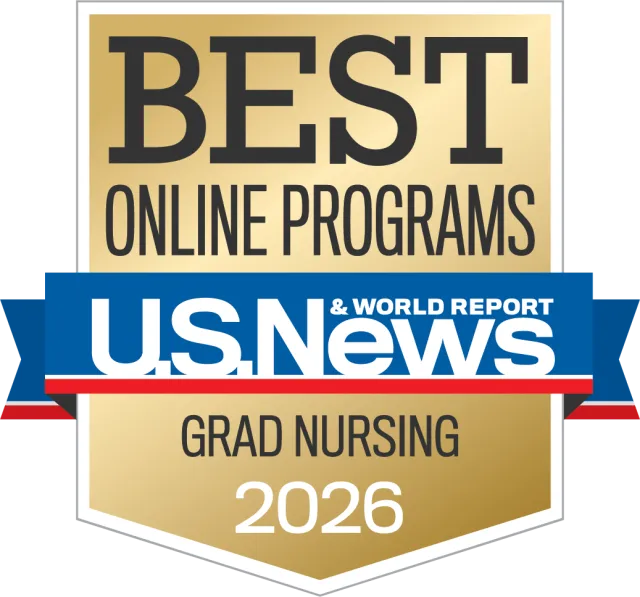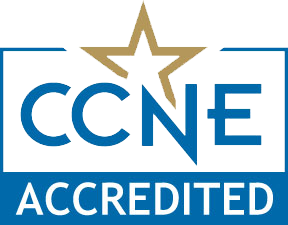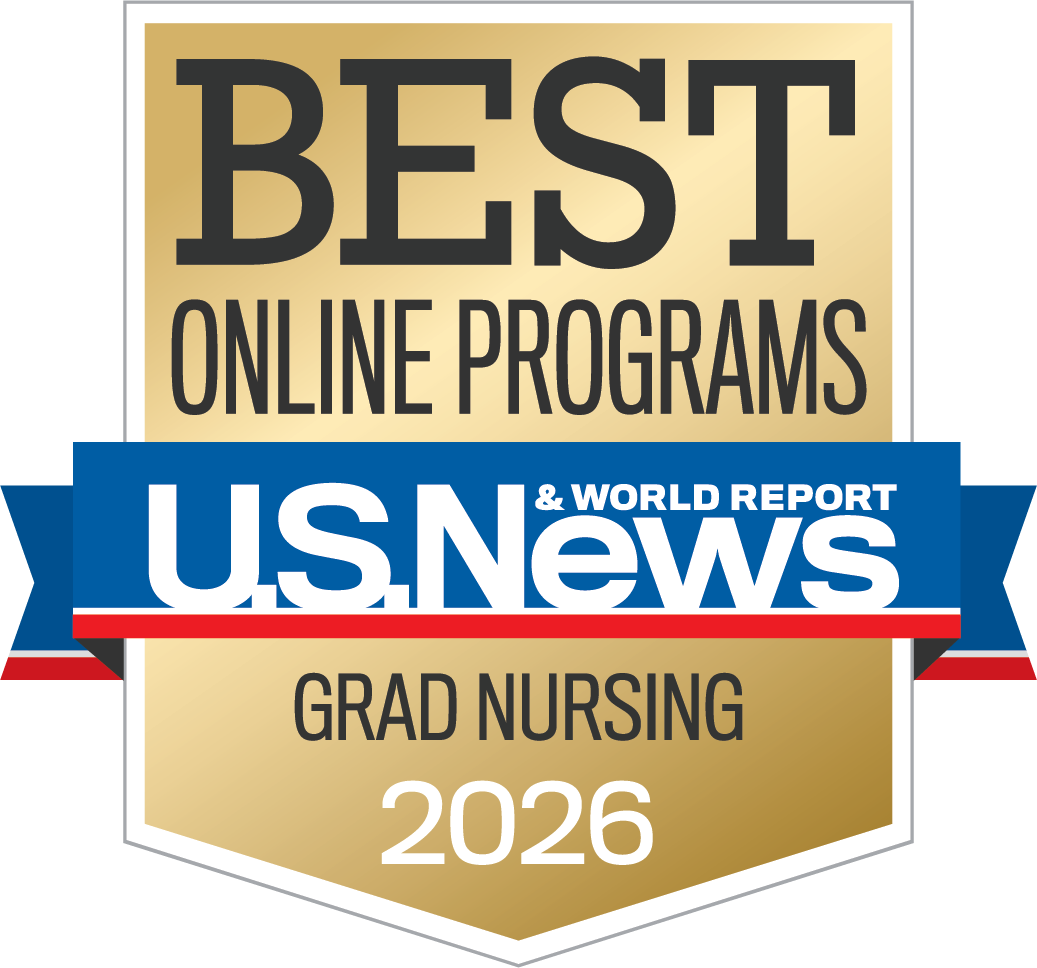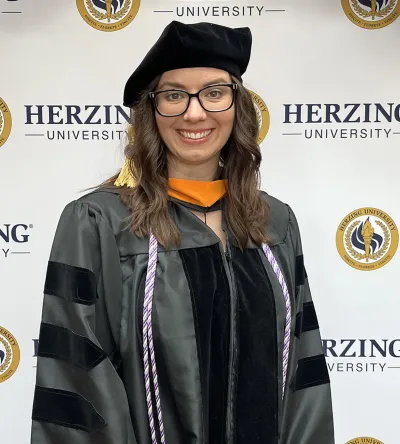Quick facts about the MSN to DNP-Public Health Nursing program
| Accreditation | CCNE accredited†, Accredited by the Higher Learning Commission |
|---|---|
| Curriculum | Complete specialty public health nursing courses and core doctoral-level courses to earn the terminal degree in nursing and prepare for certification in a new specialty |
| Format | 100% online didactic classes, hands-on clinical experience, and completion of a DNP Practice Project; final DNP project work is woven throughout the program |
| Admissions | Eligibility requirements include successful completion of an accredited MSN program with a cumulative GPA of at least 3.0 |
Learn More Today!

Ranked by U.S. News & World Report as one of the best online graduate nursing programs in 2026
Earn a DNP in less than 2 years and impact broad patient populations in public health nursing
The MSN to Doctor of Nursing Practice (DNP) - Public Health Nursing degree is a 53-credit graduate program which prepares you for a career as a forward-thinking change agent. This online degree program provides students with fundamental knowledge and skills in improvement science, collaborative practice, systems-based practice, as well as specialty topics in advocacy and policy, health promotion and education, and more.
Taking specialty courses in public health nursing while earning a DNP puts you on a pathway to making a significant difference in how nursing is done. Earn the educational foundation to make your impact and reach for the highest levels of nursing. With Herzing University your career success is possible.

Career-focused curriculum
Discover the crucial knowledge and skills required to succeed in your work and build a foundation for continued career growth.
Flexible schedule
We work hard to help you maintain school-life balance, striving to be as flexible as possible for busy non-traditional students.
Virtual services
Access to extensive virtual services, including academic advising, tutoring, support services, technical support and library services.
Lifelong support
We support your ongoing career advancement by providing comprehensive, personalized student services with lifelong career coaching.
Rolling admissions
No application deadlines to worry about. Apply when you’re ready and prepare to get started soon.
Your pathway: courses & curriculum details
The MSN to DNP in Public Health Nursing curriculum is designed both for nurses with an MSN seeking certification in their first specialty, as well as those in an existing specialty looking to transition into public health—while completing the doctoral courses required to become a leader in the nursing profession.
All didactic courses are delivered online. The curriculum includes 495 combined clinical/project hours, comprising of practical clinical experience and the DNP Practice Project.
| Program | Months i | Semester Credits |
|---|---|---|
| Doctor of Nursing Practice in Public Health Nursing – MSN to DNP | 20 | 53 |
i. Average number of months for students to complete program.
Required Core Courses
All courses, 24.00 semester credit hours, are required.
Required Specialty Courses
All courses, 21.00 semester credit hours, are required.
Required Project Residency Core Courses
All courses, 8.00 semester credit hours, are required.
Tuition & Cost
Tuition & Cost
The cost of tuition for the MSN to DNP in Public Health Nursing program is $770 per credit.
You can potentially earn even greater savings by transferring credit from prior college coursework, applying for financial aid, or potential partnership opportunities through your employer.
Our goal is your career advancement. That’s why we are always working to improve our curriculum and processes to make our program as affordable as possible while preparing you best for success in your work.
Scholarships & Financial Aid
You may be eligible for multiple scholarships and grants, both through Herzing University and several national scholarship websites.
Military/Veteran Discounts
Veterans, Active Duty U.S. Servicemembers, and spouses may qualify for a 10-20% tuition discount.
Admissions requirements
Requirements to enroll in the MSN to DNP in Public Health Nursing program include the following criteria:
- Hold a current, active, and unrestricted license as a registered nurse (RN) in the same state in which they live. (Note: Holding a multi-state, compact state license and being a resident in a compact license state will be deemed to have met this requirement.)
- Successful completion of an MSN program with a Cumulative Grade Point Average (CGPA) of 3.00 or higher
- MSN must be an ACEN, CCNE, or NLN accredited program
- Must not have failed from previous doctoral program
- Completion of a background/clinical compliance check
- Alabama
- Alaska
- Arizona
- Arkansas
- California
- Colorado
- Connecticut
- Delaware
- Florida
- Georgia
- Hawaii
- Idaho
- Illinois
- Indiana
- Iowa
- Kansas
- Kentucky
- Louisiana
- Maine
- Maryland
- Massachusetts
- Michigan
- Minnesota
- Mississippi
- Missouri
- Montana
- Nebraska
- Nevada
- New Hampshire
- New Jersey
- New Mexico
- North Carolina
- North Dakota
- Ohio
- Oklahoma
- Pennsylvania
- Rhode Island
- South Carolina
- South Dakota
- Texas
- Utah
- Vermont
- Virginia
- West Virginia
- Wisconsin
Accreditation & Recognition
Our accredited & recognized online school
We strive to earn rank as one of the top private, nonprofit universities in the United States. Just as you work every day to become the best version of yourself, so do we as a university.
We are proud to have attained institutional and programmatic accreditation in addition to industry recognition for our accomplishments helping students earn a college education and find career success.

✝The doctor of nursing practice program at Herzing University Madison is accredited by the Commission on Collegiate Nursing Education (http://www.ccneaccreditation.org). Herzing University is approved to offer programs in an online learning modality through association with the main campus in Madison, Wisconsin.

Ranked by U.S. News & World Report among the best online graduate nursing degree programs in 2026.
Herzing University is institutionally accredited by the Higher Learning Commission (hlcommission.org), a regional accreditation agency recognized by the U.S. Department of Education.
Waived Enrollment Fee
Discover the educational pathway designed to maximize your career potential. Reach for greater heights with Herzing University.
Make an impact in your community as a doctorally-prepared public health nurse



Our program is designed to provide you the fastest path to both earn the highest degree in nursing and become a public health nurse.
Degree qualifications vary across many types of different jobs in public health nursing.
However, if you’re looking to reach the top of the field and become an influential decision-maker, earning a degree at the doctoral level with a curriculum emphasis in public health can prepare you well for directorial and managerial positions.
Becoming a Public Health Nurse
Job Outlook
Graduate from a DNP program with a specialization in public health and you’ll be prepared to join a career field expected to grow rapidly over the next 10 years.
According to the Bureau of Labor Statistics (BLS), employment of medical and health services managers is expected to rise 23% from 2024-2034, much faster than the average across all U.S. occupations.*
Program Finder
MSN to DNP - Public Health Nursing
OnlineTo learn more about this program, click the Request Info button.
The Student Experience at Herzing
As a grad, I earned a position at a local medical center in their orthopedic unit at night. I can’t wait to get started!
Micah Thomas
Nursing | Birmingham CampusEven at 44 with a family, I managed full-time school, clinicals, and weekend work, and emerged successfully!
Jami Van Brocklin
Nursing | Online CampusIt’s a blessing to have found my calling as a nurse. Caring for others gives me strength and satisfaction. Knowing that I can make even one more life better is what pushes me to carry forward every day.
Richard Onyait
Nursing | Madison CampusMy family, friends, and of course, Herzing, were always there to help me! Never underestimate how much a good support system can help you stay successful.
Carleigh Wenzel
Nursing | Brookfield/Milwaukee CampusI would not be where I am today without the help of Herzing!
Valerie Ketterhagen
Nursing | Madison CampusDisclosures
* BLS pay estimates calculate the median annual wage for various occupations. Per the BLS the median wage for an occupation is: "The wage at which half of the workers in the occupation earned more than that amount, and half earned less. Median wage data are from the BLS Occupational Employment and Wage Statistics survey." Bureau of Labor Statistics (BLS), U.S. Department of Labor, Occupational Outlook Handbook 2024. BLS median wage estimates do not represent entry-level wages and/or salaries. Multiple factors, including prior experience, age, geographic market in which you want to work, and degree level and field, will affect career outcomes, including starting salary and earnings as an experienced employee. Herzing neither represents that its graduates will earn the median salaries calculated by BLS for a particular job nor guarantees that graduation from its program will result in a job, promotion, particular wage or salary, or other career growth.
Recent Blog Posts
Waived Enrollment Fee
Discover the educational pathway designed to maximize your career potential. Reach for greater heights with Herzing University.






